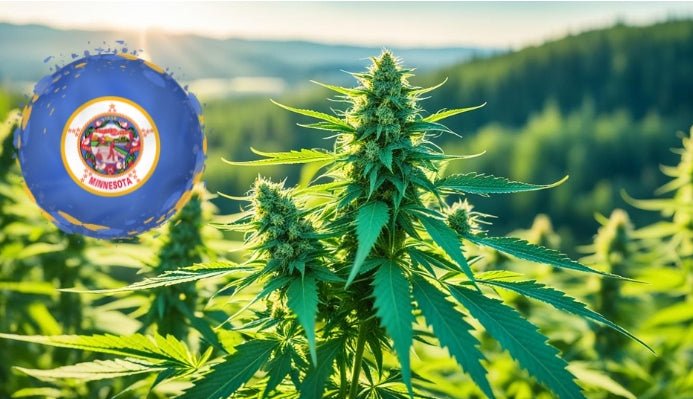The 'Show Me State' is the latest example of just how convoluted and confusing the witch hunt to eradicate hemp-derived intoxicants across the country has become.

The Civil War continuing to rage between hemp and cannabis interests has reached the hearty and supposedly no-nonsense state of Missouri. According to multiple local and national media outlets, Missouri Attorney General Andrew Bailey (R) opened an investigation into four businesses as part of a crackdown on items containing intoxicating hemp derivatives (IHDs) last Wednesday.
Similar to other states, the effort in Missouri centers on concern over the potential adverse health effects of hemp-derived intoxicating cannabinoids, such as the often vilified and widely misrepresented delta-8 THC.
For Bailey, the biggest problem with products containing IHDs is that they are not clearly labeled to indicate that these items could get the consumer "high." "When purchasing products, Missourians have a right to know if they will be subject to serious and potentially dangerous side effects, like psychotic episodes, severe confusion, hallucinations, and other life-threatening problems," Bailey stated in his press release.
"When purchasing products, Missourians have a right to know if they will be subject to serious and potentially dangerous side effects, like psychotic episodes, severe confusion, hallucinations, and other life-threatening problems."
- Missouri Attorney General Andrew Bailey (R)
One of the most frustrating aspects of the war on IHDs is the rampant misinformation, and flat-out propaganda spread about the legality and regulation of the products in question. Much of the dubious information concerns whether or not IHDs are regulated.
While the 2018 Farm Bill did legalize hemp and all of its downstream derivatives and uses, Congress did very little to set up a regulatory infrastructure for the eventual flood of IHD products that resulted from the seismic policy shift concerning hemp.
As a result, a few bad actors in an industry comprised of tens of thousands of businesses introduced a smattering of ill-conceived products into the market, causing a handful of documented episodes of illness.
No one in Missouri or any other state confronting the issue of IHD legality and safety is calling for there to be no rules and regulations monitoring the industry. All parties, including the companies manufacturing the products, the stores selling them, and elected officials, want age restrictions and label and testing requirements.
The problem lies in the best approach to achieving those necessary and responsible goals. Two GOP state lawmakers have proposed multiple bills to address the age, label, and testing requirements. However, that legislation would also ban the vast majority of IHD products currently on the market, effectively putting hundreds of companies out of business.
Because of the impasse created by the measures' excessively punitive bans, they will unlikely receive the necessary votes to make it to the governor's desk for his signature. Bailey's investigation has compounded the issue, creating uncertainty and confusion.
While he appears to be joining the fight to regulate the products in question, it is unclear who he's targeting in his inquiry. His office issued a "civil investigative demand," which are essentially subpoenas, to CBD Kratom Connect LLC of St. Louis, a company several leaders in the Missouri hemp industry say they've never heard of and has almost no online presence indicating it has any operations in the state.
Some advocates and stakeholders have openly wondered if the attorney general meant to target CBD Kratom, one of the largest manufacturers of IHD products in the state and country. When asked for some clarification, Madeline Sieren, spokeswoman for the Attorney General's office, said: "Unfortunately, because the investigations are ongoing, I cannot comment beyond what is written in the CIDs."
Based in St. Louis, CBD Kratom operates over 60 retail locations in cities like Chicago, Dallas, Houston, New York, Philadelphia, and St. Louis. The company's owner, David Palatnik, says his organization has no affiliation with CBD Kratom Connect and isn't sure exactly why Bailey is going after such a seemingly insignificant player in the market.
Ironically, during hearings regarding the proposed GOP-led legislation, Palatnik testified in support of prohibiting products resembling candy that are particularly attractive to underage minors, the same issue Bailey is hoping to eradicate through his investigation.
"It's an issue in the industry that some people sell child-looking packaging that is also fraudulent and is also a violation of federal laws. So we'd agree with the attorney general on that front," Palatnik said.
"It's an issue in the industry that some people sell child-looking packaging that is also fraudulent and is also a violation of federal laws. So we'd agree with the attorney general on that front."
- David Palatnik, Owner of CBD Kratom
Palatnik also added that his company ensures all of its intoxicating items have transparent labeling. He said the only reason he opposes the legislation is its devastating economic impact on the state's hemp industry.
Vince Sanders, owner of American Shaman, one of the other four companies targeted by Bailey's investigation that makes edible gummies and chocolates containing IHDs, says his products are sold in child-proof containers, similar to what is required by state law for marijuana products.
"They all say '21-plus.' If you're in one of our stores, you actually have to sign a document that says you understand that these are psychoactive," Sanders said.
"They all say '21-plus.' If you're in one of our stores, you actually have to sign a document that says you understand that these are psychoactive."
- Vince Sanders, Owner of American Shaman
For its part, the Missouri Hemp Trade Association (MHTA) has tirelessly pushed for legislative measures such as prohibiting sales to minors and mandating clear user instructions and rigorous product testing.
However, the MHTA's most significant problem with the current legislation is that it places IHD products under the same constitutional rules and regulations governing the state's marijuana industry. The most problematic part is the mandate that these products be sold at licensed retail cannabis dispensaries regulated by the cannabis division of the Missouri Department of Health and Senior Services.
With no new marijuana facility licenses currently available, there would be no workable pathway for current hemp storefronts to sell these products. Other proposed measures floating about the state capital, backed by the hemp industry, empower the Division of Cannabis Regulation to issue licenses to companies that sell intoxicating hemp products and oversee age restrictions and labeling requirements.
However, they also lack the necessary support and votes at the State House to pass and make it to the governor's office. The overriding question remains. How do states combat genuine health and safety threats by a loosely regulated and wildly popular market sector?
There must be a path to compromise enabling the vast majority of law-abiding hemp businesses to continue to operate and supply customers with a much-needed and economically viable set of product offerings while also keeping the public, particularly children, safe from any bad actors.
The industry ($28 billion) is too big, too important, and politically powerful to brush aside and ignore. Big Cannabis is losing this ill-advised Civil War. It is time for level heads to prevail and for a mutually beneficial solution to be agreed upon and implemented.








































